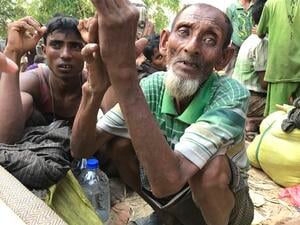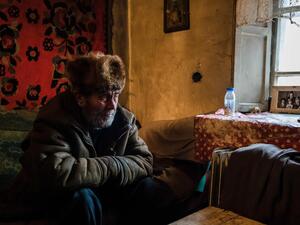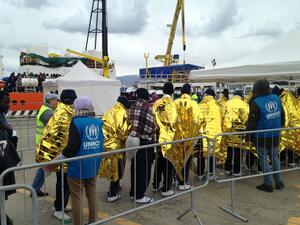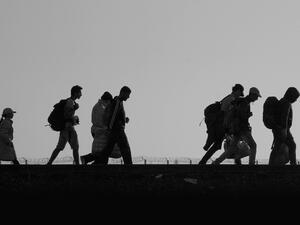Cyprus: The twisted reality behind the statistics
Cyprus: The twisted reality behind the statistics

An asylum seeker in Nicosia showing the documents he received in Cyprus after submitting an asylum application.
NICOSIA, Cyprus, Jan. 13 (UNHCR) - The headlines on asylum statistics have been consistent for the past couple of years: "Asylum applications drop in industrialised countries" (May 2003); "Industrialised countries hit lowest asylum numbers since 1987, says UNHCR" (August 2004). Industrialized countries have seen the numbers of new asylum seekers more than halve since its peak in 1992, a trend mirrored within the European Union.
However, a closer look at UNHCR's exhaustive quarterly industrialized country asylum tables reveals a very discordant element: Cyprus.
An annual total that leapt 363 percent between 2002 and 2003, when during the same period the total in Europe as a whole fell by 20 percent. A 499 percent increase when the first nine months of 2004 are compared with the same period in 2003. A staggering 563 percent increase in the last quarter of 2003, when the surge began.
Cyprus is the third smallest of the 25 EU states, with a total population of 731,000 in the part of the country controlled by the recognized government. The number of new asylum seekers making applications in the government-controlled part of Cyprus in 2004 (with December still to be counted) was 7,375. On a per capita basis, this would be the equivalent of 600,000 new applications in the United Kingdom or more than 800,000 in Germany. While such theoretical comparisons have obvious limitations (at the end of the day there is still a huge difference between 7,000 and 800,000), they do nevertheless highlight the starkly different trend that Cyprus has been experiencing compared to most of its fellow EU member states.
So where are all these asylum seekers coming from? Is this the proverbial "invasion" beloved by right-wing politicians and tabloid newspapers? Are they really refugees? Why Cyprus? And how is it coping?
The answer is that the phenomenon is more the result of a strange migration quirk than a wave of new arrivals. Most of the asylum seekers in Cyprus are indeed misusing the system - but in a way that is more misguided than nefarious. Most of them were already in the country legally - at least initially - before they made their asylum claims and helped create a whole swathe of statistics that could very easily be misinterpreted.
Although Cyprus's asylum seekers come from around 40 different countries, since late 2003 half of them have come from just two: Bangladesh and Pakistan. Most are students, who came to Cyprus on legitimate student visas or legitimate work visas.
In 2002, just 71 Pakistanis and not a single Bangladeshi claimed asylum. Then towards the end of 2003, something changed. By the end of the year, 2,077 Bangladeshis and 480 Pakistanis had claimed asylum - the overwhelming majority of them in the last three months of the year.
A number of factors seem to be involved - first and foremost the fact that asylum seekers are allowed to work, and people on student visas are not.
"I feel sorry for them," said Andreas Agrotis, an eligibility officer with Cypriot Asylum Service. "They are very poor, and they spend all their savings in order to come to Cyprus. I dealt with many cases where asylum seekers arrived in Cyprus on student visas and after a while they dropped their studies as they could no longer afford to pay their tuition fees. When asked why they applied for asylum, the usual answers were that there was no other way to legalize their stay in Cyprus, or that they gave all their money to the agent that brought them to Cyprus, and as such they could not go back to their countries, because they came from poor families that could not support them."
This version of events is supported by Tuhin, a 24-year-old Bangladeshi who has spent the last four years in a private college in Cyprus. Tuhin says he knows lots of people from his country who have applied for asylum, and puts most of the blame on the agents operating in Bangladesh. "It's the agents who give the wrong information to all those boys: they tell them to come to Cyprus and then lead them to believe that parallel to their studies they will be able to work."
According to Tuhin, some of the students' parents have gone so far as to sell their land or shop in order to pay the US$3,000-7,000 demanded by the agents. Part of this sum goes to the agent and the rest to the college in Cyprus, where their children are enrolled. They do this in the belief - carefully nourished by the agents - that this is the best way to provide their children with a better future.
Naveed, a 24-year-old Pakistani student, has been through precisely the sort of process of misinformation, expectation and disillusionment described by Tuhin. "Agents back in my country give out the wrong information," he says. "They tell people that Cyprus is like America and Canada, where they will be able to earn money and send it back to their families."
Naveed wanted to come to Cyprus - a country well known for its tourism industry - to study hotel management. "I have no problems in my country and my intention was to go back after I finished my studies and open a restaurant."
Like so many others, he says he was cheated by his agent. "When I came here last August, I found that he never paid the college with my money. Broke, I started asking around what to do. They told me to apply for asylum. So I did in October, without knowing why a person applies for asylum."
The Cypriot authorities only assumed responsibility for assessing asylum claims in January 2002 - prior to that, UNHCR decided which asylum seekers were genuine refugees. As in some other new EU states in Central Europe, the system is young. After some initial teething troubles, additional first-instance staff had been hired and trained by the summer of 2003, and the system was starting to function well. A few months later the numbers soared as Bangladeshis and Pakistanis on student or expired work visas suddenly discovered what appeared to be the magic solution to their woes.
To their credit, the Ministry of Interior and its staff, overburdened as they have been with the sudden surge in asylum applications, have made a great effort to continue dealing with applications in a protection-minded spirit.
"Our priority is to protect those in real need," says Makis Polydorou, Director of the Cypriot Asylum Service. "At the same time however, we have to combat abuse, without infringing the rights of asylum seekers and refugees."
Sotos Ktoris, an administrative officer in the Asylum Service, says the service is currently focusing on the groups presenting large numbers of manifestly unfounded claims. "But that leaves no time to deal with cases that could well be genuine. Thus we are delaying the processing of the few cases from, for example, Ivory Coast, Congo, Sudan."
Cyprus's overall recognition rate between January 1 and November 30, 2004, was 3.6 percent. If the number of cases closed through withdrawals or failure to turn up to interviews is included, the rate falls to around 1.5 percent. Similarly extraordinarily low recognition rates in Slovakia and Greece have aroused repeated expressions of concern by UNHCR, given that the asylum seekers being rejected include large numbers from countries and regions that have been producing a relatively high proportion of genuine refugees, such as Saddam Hussein's Iraq (in the case of Greece) and Chechnya (in the case of Slovakia).
But Cyprus's extremely low recognition rate is not challenged by UNHCR. "We believe it to be fair," said Betsy Greve, the outgoing head of UNHCR's office in Nicosia. "The huge majority of cases are simply not refugees, but students or economic migrants who have been misled to believe that they should apply for asylum in order to prolong their stay in Cyprus."
Cyprus's unfortunate migration loophole is in the process of being closed. In October, the Cypriot authorities - with the full backing of UNHCR - introduced a fast-track procedure for the big backlog of cases believed to be manifestly unfounded. During the first two months, 1,788 asylum seekers had their cases decided, mostly Bangladeshis and Pakistanis. Of these, 352 were rejected, 20 were given refugee or humanitarian status (12 Iranians and 8 Palestinians) and 1,416 had their cases closed - mostly because they withdrew their request or because they did not show up for their interviews.
In another new development, during the last few months a number of students whose asylum claims were rejected have been immediately deported back to their home countries without being able to finish their studies - thereby sending a strong message that the ruse of falsely claiming asylum is actually now counter-productive.
In addition, since the beginning of 2004, the authorities have introduced much tighter controls on the issuance of student visas, with migration officers sent out to countries of origin to check applications more thoroughly. Reports suggest that around 90 percent of student visa applications are now being rejected for reasons such as fraudulent documents or because the candidate does not speak English - without which they could not possibly carry out their studies in Cyprus.
The role played by some colleges in this affair has also been an issue of somewhat heated debate between the government and the colleges.
Perhaps most important of all, the government is also planning a major change to the aliens and immigration law which will include an element giving foreign students the right to work on a part-time basis.
Possibly partly as a result of word starting to go round that the asylum game was up, the number of applications by Bangladeshis and Pakistanis fell by 24 percent and 20 percent respectively in November, 2004 - although some Chinese students and Sri Lankan workers on expired visas appeared to be belatedly trying to jump on the same bandwagon.
Naveed, the Pakistani student who along with so many others applied for asylum for the wrong reason, has withdrawn his request. "After a while," he says, "I realized that this application does not help me in any way. I came here to study and I have no problems in my country. So I decided to withdraw my application, as it was clear to me that I did not do the right thing. Luckily for me, my family can pay for my ticket back to Pakistan. I'll join my father's business. As for my plans for opening a restaurant, this will have to wait."
It is to be hoped that in the future, as Cyprus tightens its student programmes, and a more accurate message about its asylum system is relayed back to countries such as Pakistan and Bangladesh, that fewer people like Naveed are lured into a sad and untenable predicament. Then the Cypriot statistics will give a more accurate reflection of asylum realities.
By Emilia Strovolidou in Nicosia
and Rupert Colville in Geneva








